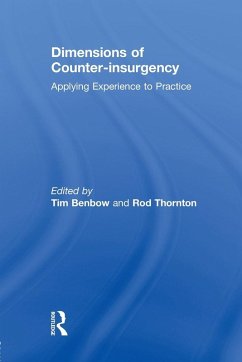
Dimensions of Counter-insurgency
Applying Experience to Practice
Herausgeber: Benbow, Tim; Thornton, Rod
Versandkostenfrei!
Versandfertig in 1-2 Wochen
177,99 €
inkl. MwSt.

PAYBACK Punkte
89 °P sammeln!
The once-neglected study of counter-insurgency operations has recently emerged as an area of central concern for Western governments and their military organizations. While counter-insurgency represents a hugely challenging form of contemporary warfare, there exists a considerable body of experience that offers assistance in the form of examples of both good and bad practice. The main aim of this book is to present these examples and the lessons that can be drawn from them. Such lessons can be of considerable benefit to today's policy-makers and military practitioners. The book also considers ...
The once-neglected study of counter-insurgency operations has recently emerged as an area of central concern for Western governments and their military organizations. While counter-insurgency represents a hugely challenging form of contemporary warfare, there exists a considerable body of experience that offers assistance in the form of examples of both good and bad practice. The main aim of this book is to present these examples and the lessons that can be drawn from them. Such lessons can be of considerable benefit to today's policy-makers and military practitioners. The book also considers how these lessons can actually fit into the contemporary framework - as defined by military, political and institutional logic - that shapes and bounds today's counter-insurgency warfare. Dimensions of Counter-Insurgency explores a number of key themes including: the experience of counter-insurgency in the Middle East; the contribution of maritime and air forces; the challenges posed in adapting Western armed forces to their new tasks; and the responses made - in light of the perceived need for international action against insurgencies - by multilateral institutions such as NATO and the European Union. This book features a broad range of contributions from academics and military thinkers on both sides of the Atlantic. This was previously published as a special issue of Contemporary Security Policy.












